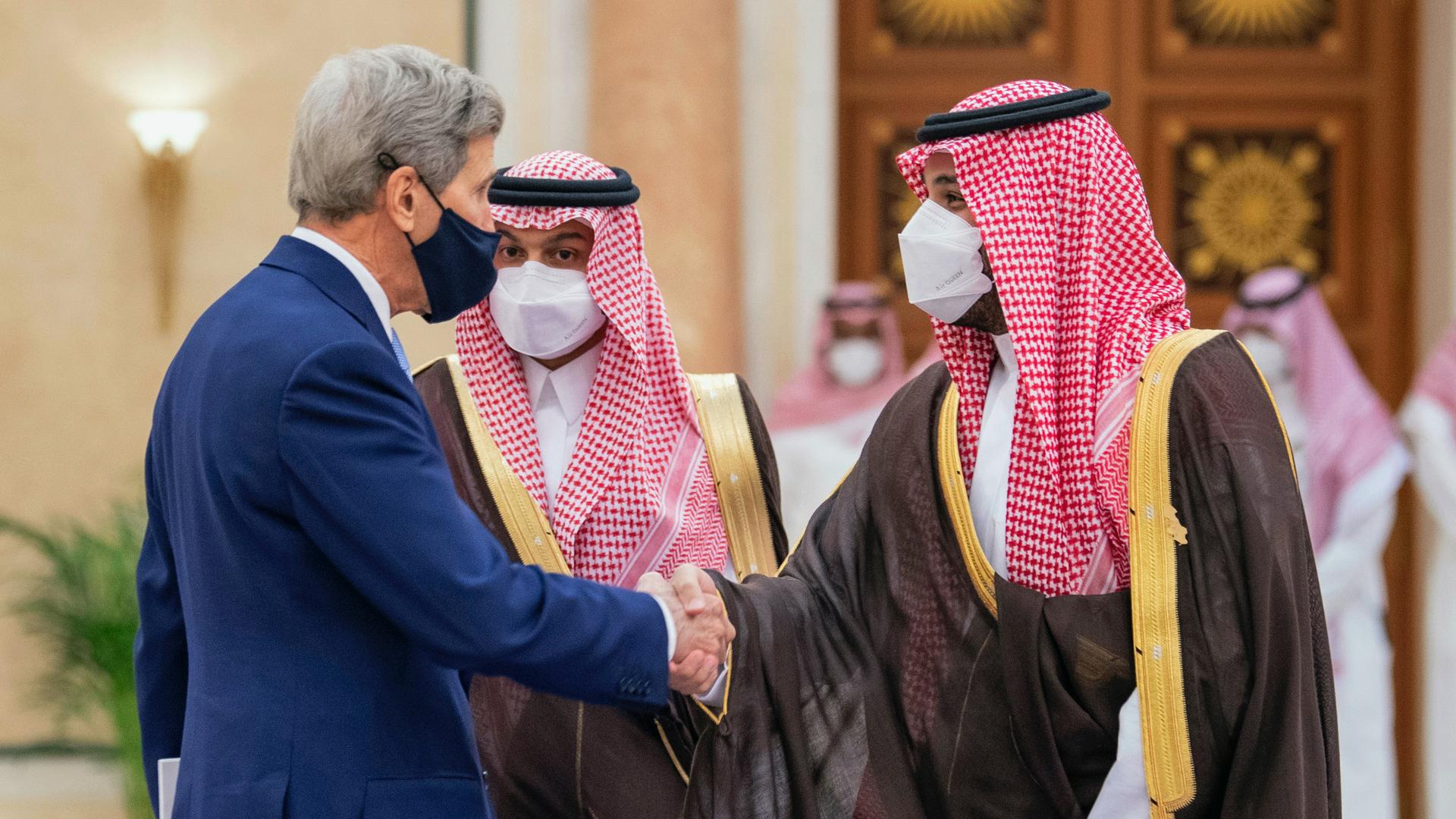Oil giant Saudi Arabia says it wants to get to net-zero emissions by 2060. But critics question its roadmap.
In the lead-up to COP26, the UN climate summit underway in Glasgow, Scotland, Saudi Arabia’s Crown Prince Mohammad Bin Salman announced that the country will reach zero emissions by 2060.
He said that Saudi Arabia will reduce its carbon emissions by shifting to renewable energy using carbon capture technologies and by planting 10 billion trees.
But some analysts question Saudi Arabia’s proposed methods to get to net-zero by 2060.
Related: Why COP26 is the ‘last, best hope’ for fighting climate change
“They set these dates far into the future on purpose because it means that the people who issue them probably won’t be in power by the time that they approach,” said Ellen Wald, author of “Saudi Inc.: The Arabian Kingdom’s Pursuit of Profit and Power,” adding, “So, I take a lot of these things with a grain of salt.”
Wald said the Saudis are arguing for a relatively slow approach to addressing climate change because they say they need oil money to invest in cleaner energy and they need time to figure out new ways to run their economy.
They have already done some of that work through the country’s Vision 2030 plan, which aims to diversify the economy.
Last week, leaked documents revealed that the Saudis have been lobbying to water down a landmark UN climate report.
“Saudi Arabia repeatedly seeks to have the report’s authors delete references to the need to phase out fossil fuels, as well as an IPCC [International Panel on Climate Change] conclusion that there is a ‘need for urgent and accelerated mitigation actions at all scales,’” the report says.
The country even objects to the IPCC’s use of the word “transformation,” to describe emissions reduction pathways to meet the Paris agreement’s goals to limit global warming to well below 2 degrees Celsius, the report goes on to say.
According to the leaked documents, other countries such as Argentina, Australia and Brazil had tried to influence the report as well.
Related: US credibility on climate on the line in Washington
Wald said the report is significant because once it’s issued, it becomes the baseline for negotiators to reference. “So, if they can get that language out of the report, then it doesn’t become the baseline.”
The Saudis also point out, Wald said, the continuing global demand for oil.
“[The Saudis] believe that if we start to phase out fossil fuels at this point, then there will be countries, particularly developing countries in Africa, that are left in the state of energy poverty.”
“[The Saudis] believe that if we start to phase out fossil fuels at this point, then there will be countries, particularly developing countries in Africa, that are left in the state of energy poverty,” Wald explained.
Saudi Arabia is the world’s biggest oil exporter; oil and gas make up roughly 90% of its revenue.
“The Saudi economy and the Saudi political system are almost totally dependent on oil exports,” said Jim Krane, an energy research fellow at Rice University’s Baker Institute for Public Policy.
For years, Gulf monarchies, including Saudi Arabia, he said, have relied on oil to build political support at home and maintain influence abroad.
So now, as the world starts to look to a future beyond fossil fuels, the kingdom finds itself in a real bind.
Related: Discussion: Climate change and a deepening global health crisis
“The ruling family in Saudi Arabia sees climate action as a threat not just to its economy but to its existence as a monarchy,” Krane said.
As part of its plan to reduce emissions, Saudi Arabia has put forward goals like capturing carbon dioxide and storing it underground or recycling it, a technique called “circular carbon economy.”
“The idea of a circular carbon economy is that the carbon will go around in circles and as a result there is a component here which is taking carbon out of the atmosphere and burying it deep underground,” said Karim Elgendy, a fellow with the environment and society program at Chatham House in the UK. “And that component is still very expensive and the maturity of these technologies to become commercially viable is not expected before 2040.”
As for the idea of planting trees in Saudi Arabia, Elgendy wonders where the water is going to come from.
“The question is, can it be done in a sustainable way that is good for the ecosystems and good for climate at the same time?” he said.
The Saudi initiative focuses only on emissions inside its borders. So, any oil that gets shipped elsewhere goes unaccounted.
Elgendy sees the Saudi initiative as part of a broader, regional shift toward a cleaner energy policy.
Related: Ghana’s vegetable sellers see produce dwindle due to climate change
“The Middle East and North Africa region has not only jumped on the climate bandwagon but it also wants to control the steering wheel for that bandwagon and move it in a way that suits it better,” he said.
The United Arab Emirates, Qatar, Turkey and Bahrain have all put forward their own climate plans.
That’s because leaders in these countries, Krane said, are realizing that they, too, are on the front lines of climate change.
“These are some of the hottest places on Earth,” Krane said. “We’re seeing new high temperatures in the Middle East, really dangerous temperatures. So, losing air conditioning will be like a mass casualty event.”
What is clear though, is that oil-producing countries like Saudi Arabia and the UAE have no immediate plans to stop pumping oil.
“As long as the world needs hydrocarbons, we will be supplying hydrocarbons,” Mariam Almheiri, the UAE’s minister of state for climate change and environment, said in an interview with Bloomberg last week.
“We can’t just switch off the tap. This is an energy transition,” she said.
